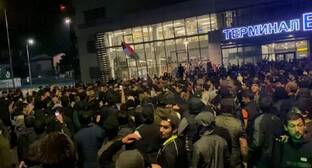14 January 2009, 20:00
Human rights activist from Chechnya asks Russian President to get into the case of former militant
Aslambek Apaev, expert of the Moscow Helsinki Group for Northern Caucasus, has addressed his open letter to President of Russia Dmitri Medvedev. The pretext was in the litigation against Abubakar Mezhiev, a resident of the Chechen Republic.
In Apaev's opinion, Mezhiev's trial is an evident demonstration of the so-called "double standards" as applied by Russian justice.
"During the first military campaign unleashed in the territory of Chechnya Abubakar Mezhiev was a member of illegal armed formations. With the start of the second military campaign, Mezhiev left abroad and took no part in the warfare," said Aslambek Apaev. "In 2004, having believed in the amnesty of former militants, promised by the then president of Russia Vladimir Putin, he returned home. But a year later, because of resumed prosecutions, he had to go abroad again."
"In 2006, this time in response to the appeal of Chechen authorities, Abubakar came back home again and was amnestied. A year later, he himself addressed the law enforcement bodies and reported that in summer of 1995 he took part, against his will, in Shamil Basaev's attack on the city of Budyonnovsk. Immediately after his confessions, he was detained, and the amnesty act was cancelled. Mezhiev was taken to the city of Essentuki, where he is now tried," Mr Apaev has added.
"Firstly, Mezhiev has himself declared his participation in Basaev's raid on Budyonnovsk. Before, the law enforcement bodies had even no suspicions. Secondly, he had voluntary returned home and repented of his deeds. Thirdly, as far as I know, there is not a single witness who could evidence that Abubakar committed crimes in Budyonnovsk. He is just a hostage of circumstances," the human rights activist believes.
In Apaev's opinion, Russian justice should behave equally both for residents of Chechnya and for Russian militaries who had committed crimes here.
Author: Sultan Abubakarov Source: CK correspondent




